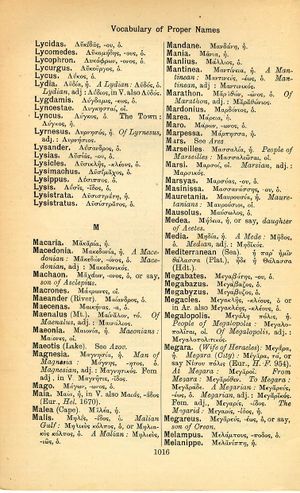Maia
οὐκ ἐπιλογιζόμενος ὅτι ἅμα μὲν ὀδύρῃ τὴν ἀναισθησίαν, ἅμα δὲ ἀλγεῖς ἐπὶ σήψεσι καὶ στερήσει τῶν ἡδέων, ὥσπερ εἰς ἕτερον ζῆν ἀποθανούμενος, ἀλλ᾿ οὐκ εἰς παντελῆ μεταβαλῶν ἀναισθησίαν καὶ τὴν αὐτὴν τῇ πρὸ τῆς γενέσεως → you do not consider that you are at one and the same time lamenting your want of sensation, and pained at the idea of your rotting away, and of being deprived of what is pleasant, as if you are to die and live in another state, and not to pass into insensibility complete, and the same as that before you were born
English > Greek (Woodhouse)
Μαῖα, ἡ, in V. also Μαιάς, -άδος (Eur., Hel. 1670).
Latin > English (Lewis & Short)
Māia: Māja (written by Cicero Majja, like ejjus, pejjus, etc.;
I
v. the letter J), ae, f., = Μαῖα.
I Daughter of Atlas and Pleione, and the mother of Mercury by Jupiter, Cic. N. D. 3, 22, 56: Majā genitum demittit ab alto, i. e. Mercury, Verg. A. 1, 297: Maiā natus, Hor. S. 2, 6, 5; Ov. M. 11, 303; Macr. S. 1, 12, 19; acc. Majam, Ov. F. 4, 174.—As one of the Pleiades: sanctissima Maja, Cic. Arat. 270: multi ante occasum Majae coepere, Verg. G. 1, 225; Ov. F. 4, 174; 5, 85.—
II A daughter of Faunus, Macr. S. 1, 12.
Latin > French (Gaffiot 2016)
(2) Măia æ, f., Maïa
1 fille d’Atlas et de Pleioné, mère de Mercure : Cic. Nat. 3, 56 ; Hor. S. 2, 6, 5 ; Virg. En. 1, 297 ; Ov. M. 11, 303

